When was the first time you became aware of discrimination or oppression?
Adele Halliday, the United Church’s Anti-Racism Equity Lead, says that parts of her work focus on racial discrimination―and she encounters many people across the church who are surprised by the ongoing systemic racism in church and society.
“I grew up as a racialized person and in a multiracial context, so this always surprises me. There’s almost a kind of initial moment of realization,” she says. “In my work, what I encourage people to do is move beyond that moment of realization, asking, ‘So what does that mean for you in your life?’ If you’re a person who’s benefited from racism, now what? What’s your next action? What does it mean for your life in the church and society as a person, as an individual, as a family member?’”
Racialized people are among the people who have felt the negative effects of racism. It can take many forms, but all are harmful. And even worse, racism still exists in Canada and in the United Church today.
Your gifts to Mission & Service support educational initiatives, programs, and partners that work hard to dismantle racism. One of these programs is the 40 Days of Engagement on Anti-Racism, which tackles topics like internalized racism, systemic racism, and anti-Indigenous and anti-Black racism.
While the program was designed for The United Church of Canada, Halliday says the impact is global. “I have gotten messages from people in other denominations and in other parts of the world like the United Kingdom, Australia, and the United States who are excited about the program and who want to use it,” she says.
“There are people who are hurting because of racial injustice and racial trauma,” says Halliday. “The work that we’re doing helps us move collectively towards healing as a church and beyond.”
A more detailed video, A Deeper Look: Fighting Racism at Home and Abroad,(opens in a new tab) is available on YouTube.
October 9 and 16, 2022
Thanksgiving and World Food Day Appeal
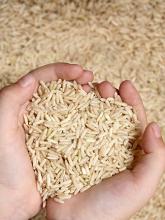
A large part of the world lives with the reality of food insecurity and over 700,000,000 will go to bed hungry tonight.
The Food and Agriculture Organization of the United Nations (FAO) created World Food Day on October 16, 1945. World Food Day events promote worldwide awareness and action for those who suffer from hunger and help strengthen the link between agriculture and food security. World Food Day falls on a Sunday this year, a week after Thanksgiving Sunday.
The United Church of Canada believes access to food is a basic right. We believe that those who work to provide food—farmers, fishers, gatherers, and hunters—as well as those who transport, distribute, and prepare food should enjoy safe and dignified working conditions and earn an adequate livelihood.
Funds raised through the Mission and Service Fund and Gifts with Vision help support community kitchens and meal programs, food cupboards, shelters, job training programs, community gardens, and healthy food programs across Canada.
Internationally, the United Church of Canada sends food in times of crisis, distributes seeds, funds agricultural training programs and micro-lending programs, and supports projects that help small-scale farmers get the equipment they need. We work with partners like ACT Alliance and the Canadian Foodgrains Bank to move beyond the charity model and work toward long-term systemic change for food security.
Visit Food Security to see some of the ways the United Church is working to end food insecurity.
In recognition of Thanksgiving Sunday and World Food Sunday the Social Justice team invites you to make a financial contribution to the Comox Valley Food Bank, which has been in operation for almost 40 years and serves over 2000 people every week.
Donations of cash and cheques can be placed in designated envelopes available in the lobby or made by e-transfer to treasurer@comoxunitedchurch.com. Please write “Food Bank appeal” on your cheques or in comment section for e-transfer.
September 30, 2022
Minute for Reconciliation

“We call upon church parties to the Settlement Agreement to develop ongoing education strategies to ensure that their respective congregations learn about their church’s role in colonization, the history and legacy of residential schools, and why apologies to former residential school students, their families and communities were necessary.”
Friday, September 30 is National Day for Truth and Reconciliation in Canada, colloquially known as Orange Shirt Day. It is a day to acknowledge the lasting harm of the residential school system, and to reaffirm our ongoing commitment of living into right relations with the indigenous peoples of this land. Part of that commitment involves continuing to learn and to work for justice.
The Indigenous Ministry of the Pacific Mountain Regional Council of the United Church of Canada promotes and initiates traditional ancestral principles to be an integral part of living faith, and trust in God and the Gospel of Christ in all relationships including conflict resolution, rites of passage, purification, and affirmation.
They have created an extensive online library of Indigenous Recommended Readings which includes key historical documents like Treaties, Truth and Reconciliation Commission Calls to Action and the United Nations Declaration of the Rights of Indigenous Peoples, as well as many articles, books, and websites. These materials are offered by the Indigenous Ministry leadership, for United Church people to explore, learn, and understand.
Visit this library part of your commitment to learn more about Indigenous issues.
Minute for Mission--September 25, 2022
Women for Change

An educational slide prepared by Women for Change shows their community-based work to develop climate resiliency. Credit: Women for Change
In areas where historically there has been little rain, now there are floods, and where there were floods, now there are droughts. That’s how Shadrick Chembe, the Monitoring and Evaluation Manager at Women for Change—an organization in Zambia that strives to improve conditions in rural communities by empowering women and girls—describes the changing climate in Zambia. And women bear the brunt of the changing climate.
“In Zambia, women are still responsible for collecting firewood and charcoal and making food. Now, because of climate change, they have to walk a longer distance to gather firewood. Charcoal is harder to get. That means it’s harder to make food. At the same time, women aren’t involved in the decision-making processes that impact this work,” explains Chembe.
Women for Change was established in 1992, and its long-standing partnership with the United Church stretches back to1995. From the beginning, mobilizing communities to share ideas and best practices has been key to the work. Since its inception, 1,500 community groups have been established, with 25-40 people in each group. The groups discuss a variety of justice-related topics.
Building climate resiliency by preparing for, recovering from, and adapting to drastically changing weather patterns is a priority. Weather extremes due to climate change coupled with companies promoting seeds that only produce a single crop increasingly put people at risk.
“The majority of farmers are poor. They can’t buy seeds, but companies have created seeds that force farmers to have to purchase them each year,” says Chembe. “Groups discuss how they can save and share seeds, what they can plant with longer or shorter rains, and if there are traditional methods that can increase food production,” he says, adding, “We are grateful for the United Church’s support. The church has really been there for many years, helping us build awareness and resiliency. It’s been a real partnership.”
Our congregation gives a designated amount of our annual offerings to the Mission and Service Fund of the United Church, which support projects such as Women for Change.
Minute for Mission--September 18, 2022
End Racism: Build Peace
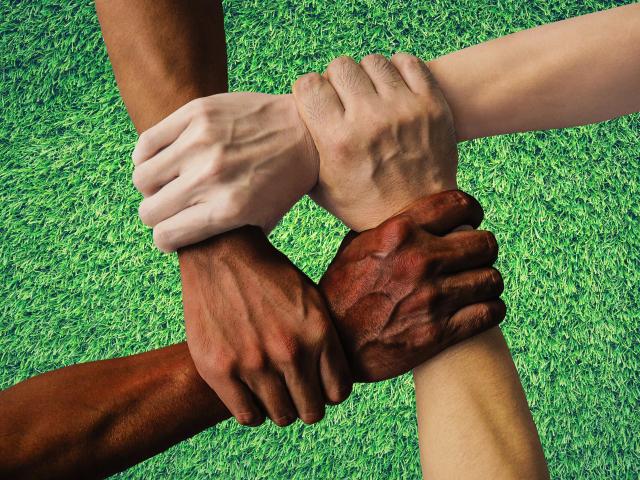
Credit: Photo: Image by Tumisu from Pixabay
September 21 is International Day of Peace and was initiated by the United Nations over 40 years ago. The theme this year is “End Racism. Build Peace.” Why?
“Racism continues to poison institutions, social structures, and everyday life in every society. It continues to be a driver of persistent inequality. And it continues to deny people their fundamental human rights. It destabilizes societies, undermines democracies and erodes the legitimacy of governments,” says António Guterres, United Nations Secretary General.
News emerging from Ukraine and fallout from the COVID-19 pandemic both illustrate Guterres’ point. As people fled Ukraine, social media feeds became flooded with reports highlighting the mistreatment and abuse of people of colour at the borders. Countless reports told the ugly tale of people of colour prevented from crossing borders while White Ukrainians were ushered to safety.
Similarly, racism reared its ugly head during the pandemic. Anti-Asian rhetoric surged alongside COVID-19, and statistics emerged revealing that people of colour were more likely to be hospitalized and die from the virus.
There can be no peace without justice. “We all have a role to play in fostering peace. And tackling racism is a crucial way to contribute,” reads the United Nation’s website. “We can work to dismantle the structures that entrench racism in our midst. We can support movements for equality and human rights everywhere. We can speak out against hate speech―both offline and online. We can promote anti-racism through education and reparatory justice.”
Our congregation gives a designated amount of our annual offerings to the Mission and Service Fund of the United Church. So part of your offering this week will help to support educational programs focusing on dismantling racism.
Learn more about the United Church’s commitment to anti-racism
Minute for Mission--September 11, 2022
Agricultural Training for Guatemala
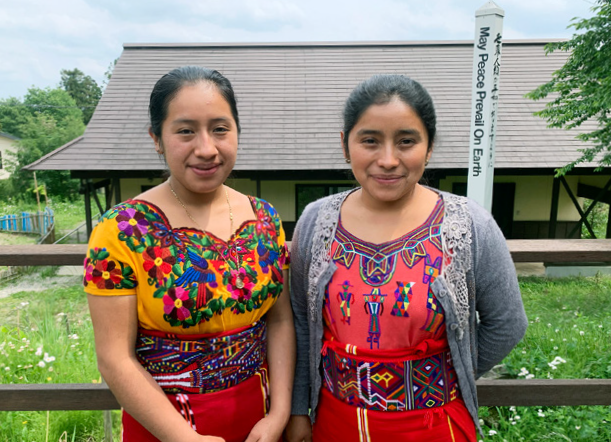
Credit: ARI
In 2019, 135 million people faced acute food insecurity. In 2022, the number of people who don’t have enough food to meet their basic needs has soared to 345 million. The United Nations calls 2022 a “year of unprecedented hunger.”
One of the ways our Mission & Service gifts are working to address hunger is by supporting agricultural training centres like the Asian Rural Institute based in Japan. Earlier this summer, 32 community leaders from around the world came to study there.
“Some enroll to solve problems like raising livestock, others to cope with climate change, and still others to find a market for organic produce. For many, it is their first time travelling outside their countries or even communities. For them, simply sharing life with people from diverse backgrounds and experiences is filled with immense learning,” reports ARI in a recent newsletter.
Marita and Ester are two of the participants. Both women work for a global organization called CIEDEG (Conference of Evangelical Churches of Guatemala), where they teach agriculture and support children’s education in church and schools. Shortly after United Church staff referred CIEDEG to ARI, the women signed up. In their own words, they describe what motivated them to apply:
“We decided to apply for this program because we wanted to learn more and improve our work. Here we are learning to work together with everyone, physically growing vegetables and caring for animals while sharing our knowledge. In our hometowns, vegetables are usually grown in monocultures. However, at ARI, we are growing multiple varieties of vegetables, taking advantage of each vegetable’s characteristics, and we look forward to learning more about this during the training so we can improve nutrition in the local market. There are many difficulties that the Indigenous Mayan people, especially women, face. Poverty is still a significant issue in Guatemala, and there are also problems such as alcoholism and discrimination among ethnic groups. These problems leave many people, especially families with single mothers, in difficult financial and nutritional situations. We want to help empower women.”
Our congregation gives a designated amount of our annual offerings to the Mission and Service Fund of the United Church. So part of your offering this week will help to provide education and training to transform communities so that no one goes hungry.
Minute for Mission--September 5, 2022
Christ's Love Moves the World to Reconciliation and Unity

The 11th Assembly of the World Council of Churches (WCC) will be held in Karlsruhe, Germany from August 31–September 8. The theme for this gathering of the Assembly (the WCC’s highest governing body) is “Christ's Love Moves the World to Reconciliation and Unity.” The Assembly convenes every seven or eight years and is the most diverse Christian gathering in the world. As well as furthering visible Christian unity, the event will address critical global concerns related to anti-racism, climate, gender, and global health.
Delegates from The United Church of Canada were selected through a nomination process and include lay people, clergy, and national church leaders. They will be accompanied by our newly installed Moderator Carmen Lansdowne, who has previously offered leadership within the World Council of Churches. Four young adults from the United Church were also invited by the WCC to be youth stewards at the Assembly. They join a dynamic group of 160 young people from all over the world to learn about the ecumenical movement and to offer service at the Assembly.
The World Council of Churches is a global ecumenical partner of the United Church of Canada and is supported by the Mission and Service Fund. Our congregation gives a designated amount of our annual offerings to the Mission and Service Fund.
Lay musicians and singers from different countries participated in the performance of a song written by the Swedish composer Per Harling, especially for the 11th General Assembly of the World Council of Churches. Listen here.
For more information about this event, and to follow the livestream of the Assembly visit the WCC website
For more information about the United Church delegates
Minute for Mission--August 28, 2022
Small Church--Big History
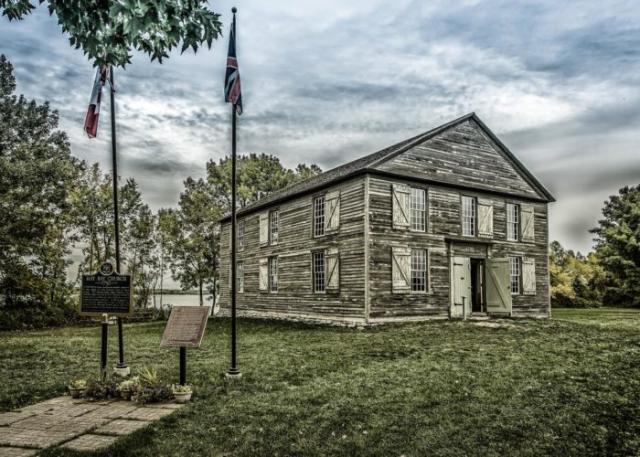
Credit: Old Hay Bay Church
Since Jesus first walked on this earth, Christians have been spiritually drawn to make pilgrimages to places connected to his birth, life, crucifixion, resurrection, and legacy. Today, pilgrimage hot spots include the Holy Land, Oberammergau in Germany, and Lourdes and Taizé in France.
Here in Canada, thousands of Christian pilgrims make their way to the small town of Napanee, ON, to visit Old Hay Bay Church each year. The last Sunday in August is the highlight of the season, when the church hosts its annual pilgrimage service.
What’s the attraction? It’s a mix of the history, scenery, spiritual connection, and community.
An unassuming building clad with greyed wood siding and wide doors that open to a plain but sturdy sanctuary, Old Hay Bay Church was originally built on the shoreline of Hay Bay, which connects to the Bay of Quinte, in 1792. It is the oldest Methodist building―and one of the oldest churches―in Canada. Now, it belongs to The United Church of Canada, and donations to the Mission & Service Fund helps ensure that it will continue to be a place of pilgrimage for years to come.
Elaine Farley, chair of the Board of Trustees and one of the church’s custodians, explains that the building, originally referred to as the “meeting house,” was the centre of the rapid growth of Methodism and hosted the first camp meeting in 1805. Methodism grew into the largest Protestant group in Canada and was the largest group of those that came together to become the United Church in 1925. She says, “Old Hay Bay Church is not just a building; it was a sacred place for our Methodist ancestors and is a place of pilgrimage for people today.”
Our congregation gives a designated amount of our annual offerings to the Mission and Service Fund of the United Church. So part of your offering this week will help to preserve important historical, theological, and pilgrimage sites in Canada.
Minute for Mission--August 21, 2022
The Right to Learn--Meshack's Story
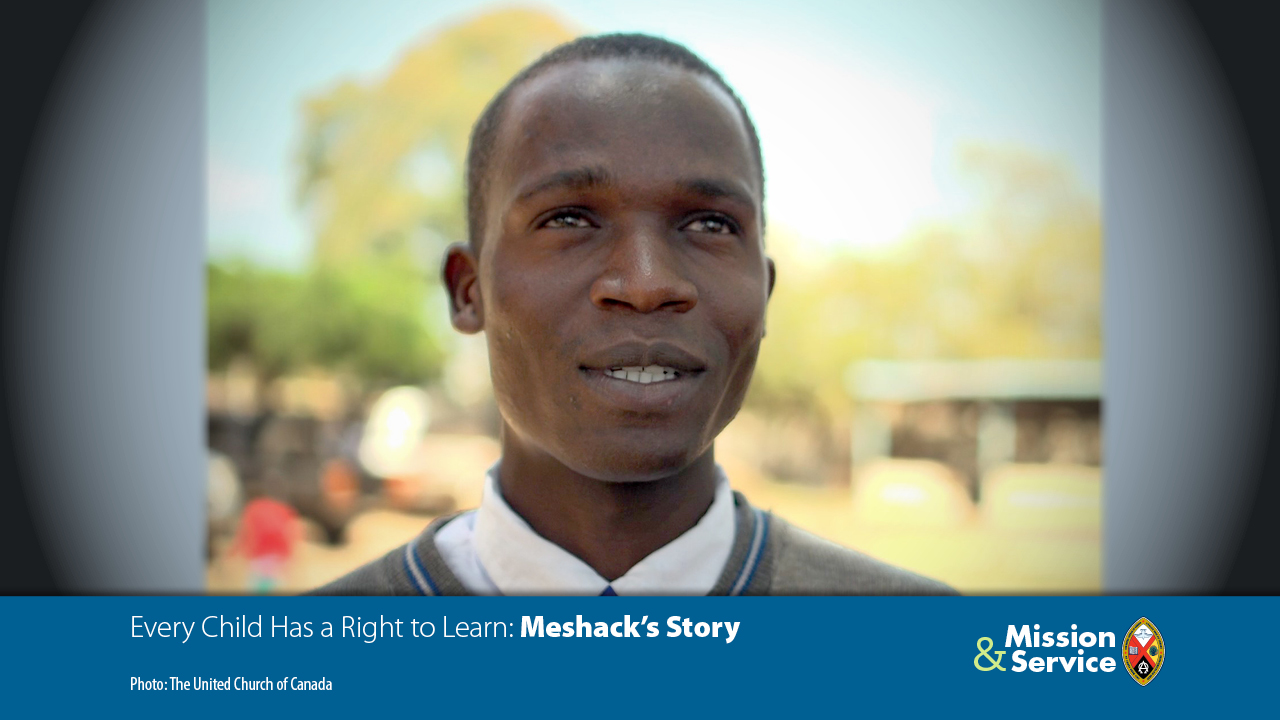
Every child has the right to learn.
Donations to the Mission and Service Fund of the United Church helps children around the world to go to school thanks to partnerships with organizations like the Kenya Alliance for Advancement of Children (KAARC).
School fees, violence, child labour, and discrimination mean that too many children can’t go to or stay in school. KAARC brings together child rights organizations to share information about child protection and safeguarding and to support children in schools.
KAARC has established over 300 child rights clubs in schools. One of these clubs helped Meshack through primary school. A bursary program helps him pay his high school fees, and the child rights club at his school is teaching him how to be a positive role model.
“Going to school was a problem for me. KAARC has helped me. They encouraged me a lot. They enabled me to start my primary school. Now I’m in high school,” Meshack says. “The club is helping us a lot, too. They give us role models to teach us what is bad and help us be confident in whatever we are doing. I’m very happy.”
Our congregation gives a designated amount of our annual offerings to the Mission and Service Fund so part of your offering this week will help to break down barriers so children can go to school regardless of where they live and how much money they have.
Minute for Mission--August 14, 2022
Camps Instill Confidence

Credit: Cave Springs Camp
Lindsay Vautour, the United Church’s Engagement and Stewardship Associate, started attending United Church camps when she was five years old. There, she not only met lifelong friends and gained job skills as a counsellor, but it also helped chart her course to eventually work for the United Church of Canada.
“Coming from a financially tight background, I’m extremely grateful for the assistance available that let my brother and me attend camp every summer. I met so many different people from a variety of cultures and regions, and got to learn their journeys in faith. I still keep in contact with some camp friends over 20 years later,” she says.
“One of my most prominent memories was with a fellow 13-year-old camper who told me that she loved camp because she could be herself without any expectations. She said, ‘I’m not the weird kid or the foster kid here, I’m just me,’” she recounts. “That’s something I resonate with, because I wasn’t particularly popular in school, but popularity never mattered at camp, and it’s beautiful to know that that’s a widely shared perception.”
Children come together at United Church camps across Canada to learn the gospel in a safe and supportive environment. Through campfire stories, hiking, music, canoeing, and so much more, campers gain confidence while enjoying unique activities and exploring their curiosity. At camp kids learn soft skills like self-confidence, patience, and organization as well as hard skills in sports, crafting, and music.
Our congregation gives a designated amount of our annual offerings to the Mission and Service Fund of the United Church. So part of your offering this week will help to support camping programmes that offer affirming experiences for children and youth.
Minute for Mission--August 7, 2022
What Would Jesus Do?

Credit: Image by congerdesign from Pixabay
The question “What would Jesus do?” (often shortened to the acronym “W.W.J.D.”) has been on wrist bands, T-shirts, and bumper stickers since the 1990s. And while it might sound like an overused cliché, it’s a question that can lead our spirit and, by extension, our lives to profound transformation.
What did Jesus do?
He crossed a lot of boundaries. In fact, when we think about the boundaries that separate people―things like money, gender, education, culture, religion, and class―Jesus crossed them all.
He struck up a conversation with a Samaritan woman in a culture where it wasn’t socially acceptable for men and women, much less Jews and Samaritans, to speak to one another.
He healed the bodies and souls of people suffering from a variety of diseases when it was sinful to have anything to do with them.
He visited the homes of tax collectors and sex trade workers and advocated for the rights of widows, orphans, and those living in poverty.
He not only valued children in a time when they were often considered drains on society, but he also told his followers that unless they were more like children they wouldn’t enter the kingdom of heaven.
In the same way, our generosity to the Mission and Service Fund of the United Church helps break down dividing walls and builds bridges that draw us together. This Fund supports organizations like hospitals, counselling centres, drop-in circles, and homeless shelters that are there when people need them most. It sustains education programs that teach farming skills, provide job training, and help remove obstacles so children can remain in school. It supports groups that stand up for victims of human trafficking, ensure that workers and children know their rights, and advocate for those persecuted because of their sexual orientation, gender, or beliefs. It also fosters anti-racism programmes and supports those working for healing and reconciliation.
Our congregation gives a designated amount of our annual offerings to the Mission and Service Fund of the United Church. Our gifts thus help to transform lives and build a better world. That’s “what Jesus would do.”
Minute for Mission--July 24, 2022
Supporting Refugees
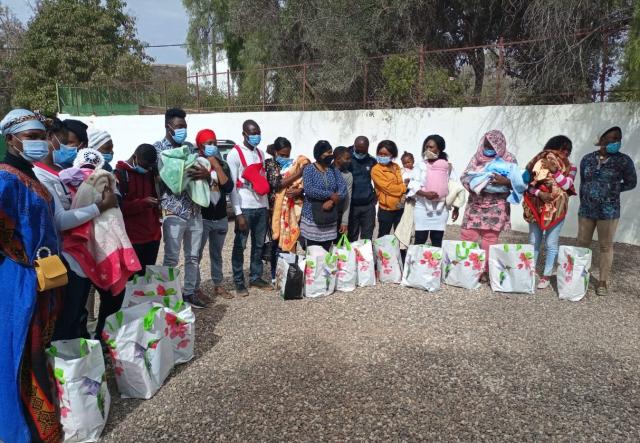
Food baskets are distributed in Agadir, Morocco. Credit: Église Évangélique Au Maroc
Although we are very aware of refugees fleeing the war in Ukraine these days, there are situations all over the world which force people to leave their home country.
In the last two years, the number of refugees and asylum seekers in Morocco has more than doubled. Today, the country is both a transit and a host country with 19,620 refugees and asylum seekers. Each person arrives in Morocco hoping for a better life for themselves and their family. Many attempt to cross the Strait of Gibraltar from Morocco to Europe, a 14-km trip.
“To give you an idea of what this ‘trip’ looks like, they get on an inflatable boat (normally made for 10‒20 people) with more than 40 people, hoping that the wind, their manual maneuvers, and God will get them to Europe. And they pay thousands of euros to get on that boat!” write Fritz Joseph and Emmanuela Loccident, who served four years in Morocco with the United Church in partnership with Global Ministries of the Disciples of Christ.
“Every day we hear of people who die trying to cross over. A lot don’t even know how to swim. Many of those wishing to cross the sea and ultimately go to Europe were, and still are, living in scarcity and poverty because they have used all their money to get to Morocco. Every country they must cross requires fees for passage. So, when arriving in Morocco, they must find a way to pay for their next and final trip to Europe.”
In Morocco, United Church Mission & Service gifts support refugees and migrants by providing life-saving medication as well as blankets, food, clothes, and professional training. “Helping migrants is one of the biggest ministries of the church. We are there for people who have nowhere else to go,”
said Fritz and Emmanuela.
Part of your offering this week will help dedicated leaders such as Fritz and Emmanuela in the life-saving work of supporting refugees.
Minute for Mission--July 10, 2022
Transformed Lives
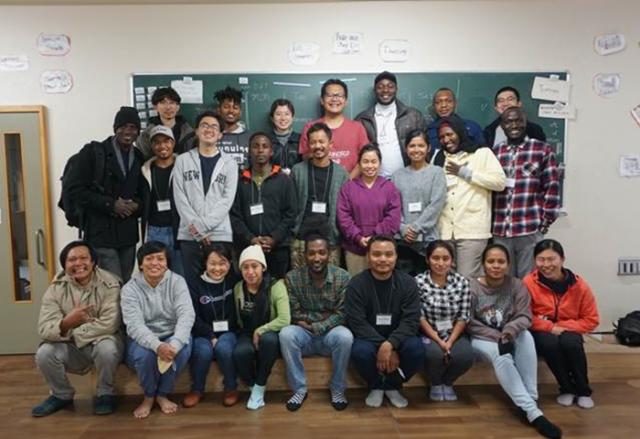
Saidath Murorunkwere (middle row, second from the right ) is pictured here with classmates.
Credit: Asian Rural Institute
Saidath Murorunkwere is one of many Rwandans whose lives were scarred by the genocide of 1994. In just 100 days that year an estimated 800,000 to 1,000,000 Rwandans were killed. Of Saidath’s extended family of nearly 200, only two aunts and a few of her siblings survived. When the genocide finally stopped Saidath and her family had to start over with absolutely nothing because everything they owned had either been burned or stolen.
To make ends meet through the following years, her mother sold charcoal and Saidath worked as a bus driver’s assistant. Many days they went without eating. Still, Saidath was determined to finish secondary school. She became a secretary and eventually studied at the University of Rwanda, where she graduated with a degree in journalism.
Despite her education, the pay was low so she began to work as a farmer and a social worker with a non-governmental organization that works to fight HIV/AIDS, malnutrition, and poverty while promoting organic agricultural practices. In that role, Saidath worked with 60 farming families to build kitchen gardens.
Inspired to make an even bigger difference, she applied to the Asian Rural Institute (ARI). There she learned about environmental conservation, educating farmers, initiating microfinance programs, attaining rights for women and children, and organizing aid for refugees. Saidath’s goal is to develop more cooperatives in her community where she can pass on skills she has learned.
Each year ARI, supported through the Mission & Service Fund, trains 25‒30 grassroots leaders (like Saidath) from Asia, Africa, and Latin America at their centre in Tochigi, Japan. Part of your offering this week will help extraordinary leaders like Saidath to make a difference in their community.
Minute for Mission--July 3, 2022
Supporting Displaced People in Ukraine
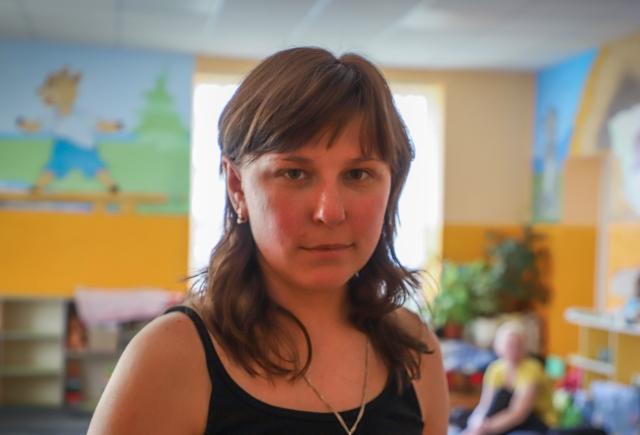
Irina in a refugee shelter Credit: Fekete Dániel/Hungarian Interchurch Aid
Recent statistics released by the United Nations are mind-boggling: More than 12 million people are believed to have fled their homes in Ukraine since the invasion began. Over 5.7 million have left for neighbouring countries, and another 6.5 million people are thought to be displaced inside the war-torn country itself.
Irina, a trained nurse, is one of these millions of people whose family has been torn apart by war. Her husband, a history teacher, joined the territorial defence in the first days of the occupation. In the beginning, Irina and her children (five and eight-years-old) moved in with her parents until nearby bombing threatened their safety.
Irina’s parents didn’t want to leave their home so after a lot of agonizing soul-searching, Irina left with her children and started walking toward the evacuation point. They were forced to take cover as shelling grew near. Eventually, after an exhausting 25 hour train journey the family arrived in Batiovo where they were welcomed into one of 120 refugee centres. There, thousands of people like Irina and her children have found shelter, warm meals, and hospitable supportive volunteers. For now the family isn’t crossing the border; Irina’s husband, sister, and parents are still in Ukraine and Irina doesn’t want to leave them farther behind. But she recognizes this might not be an option in the future.
The United Church of Canada has raised over a million dollars to support Ukrainians and, in partnership with Hungarian Interchurch Aid, some of these funds are helping to provide refugee centres with food, water, hygiene products, and household appliances.
Our own congregation has raised over $7000 to help in Ukraine. Please continue to hold Irina and the people of Ukraine in your prayers.
Minute for Ministry--June 19, 2022
Remembering Alberta Billy
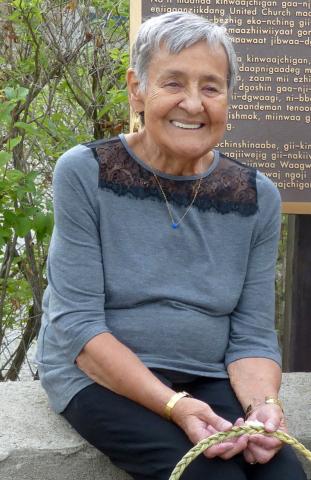
Alberta Billy on the 30th anniversary of the Apology, in Sudbury, Ontario, in 2016. Credit: Kelly Buehler
Indigenous Day of Prayer is an annual observance in the United Church on the Sunday before National Indigenous Peoples Day (June 21). This year we remember and celebrate the life of Alberta Billy, the We Wai Kai Elder who in 1985 demanded that The United Church of Canada apologize for its role in colonization and the loss of Indigenous languages, culture, and spirituality. She passed away on June 13, 2022.
Alberta’s actions and words on behalf of the Native Ministries Council at the March 1985 meeting of the General Council Executive both shocked and reverberated with those present, and ultimately led to the church’s first Apology to Indigenous Peoples at the 31st General Council in August 1986. In 2016, Alberta, accompanied by one of her grandchildren, was present to mark the 30th anniversary of the Apology in Sudbury.
These actions began a process of deep change in the United Church. Moderator Richard Bott notes that “the whole of the church is deeply indebted to Alberta Billy for what she demanded of us and called us to do. We could not be the church we strive to be without her.”
Alberta, a long-time advocate of reconciliation, reminded those present at the 30th Anniversary that the Apology is not complete. It has been acknowledged but not accepted by the Indigenous Church, which continues to look to the United Church to concretely demonstrate its commitment to a nation-to-nation relationship rooted in mutuality and respect.
As the church seeks to truly honour the Indigenous Caretakers’ Calls to the Church it would do well to remember Alberta’s faith and commitment to the Indigenous ways in which she was raised and lived, as well as to the church which she believed could always do better.
If you want to learn more about this remarkable woman an interview featuring Alberta Billy at the 30th Anniversary of the Apology can be viewed on the United Church YouTube channel.
Minute for Mission--June 12, 2022
A Better World: Anti-Human Trafficking Work in India
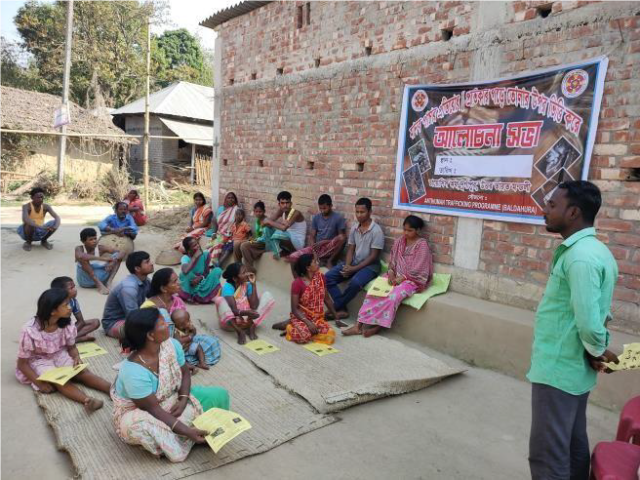
The Diocese of Durgapur in Wests Bengal has been busy initiating life-saving anti-trafficking programming, advocacy, education, and relief efforts with the support of the Mission & Service Fund of the United Church.
In 2021 their work included:
• Training 985 key people, including youth, church, and community leaders, to become aware of anti-human trafficking methods
• Computer training for 20 young people
• Teaching bamboo crafting to 9 families so they could augment their income
• Providing relief for 500 families during COVID lockdowns, including food hampers and personal protective equipment
• Installing CCTV cameras in the Malda Safe Home, which houses 21 children
Most of the people who receive help from the Diocese of Durgapur live below the poverty line and earn their livelihood through agriculture and labour. “They go to other states looking for work and sometimes fall victim to human trafficking. Now as COVID-19 restrictions are lifted, people are again getting ready to go outside the area to find employment. We are working with these people, especially in the areas where people were trafficked earlier, so they don’t become victims,” says Raja Moses, a Project Coordinator for the Diocese.
Our congregation gives a designated amount of our annual offerings to the Mission and Service Fund of the United Church.
Minute for Mission--June 5, 2022

June 5 is World Environment Day, a time for collective, transformative action on a global scale to celebrate, protect and restore our planet. One of the ways in which children (and adults) learn about the natural world is by spending time at summer camps. The Mission & Service Fund helps support a network of United Church camping programs across Canada attended by approximately 20,000 children every year. Here is the story of someone’s camping experience.
Kathleen is a special education teacher, a busy mom of three children under the age of five, and a youth and young adults coordinator at her church. She says her early summer church camp experience gave her skills that will last a lifetime and continues to impact her approach to each of these important roles.
Kathleen grew up in very formal churches where she felt she had to be perfect all the time. Outdoors, in an informal setting, her faith blossomed. “I never felt really connected to God before going to camp. It opened up my perspective of what church is. My relationship with God expanded. I learned to pray, to reflect, and to experience God in nature.”
Those early lessons continue to ground Kathleen in trying moments. “Today, because I learned to connect with God in nature, I can take time to reflect and I can show God’s love. I remind my own children that God is with them, even in the hardest times too,” she says.
Our congregation gives a designated amount of our annual offerings to the Mission and Service Fund of the United Church which helps support summer camping programmes.
Watch a video of Kathleen’s story.
For more information about World Environment Day 2022 (“OnlyOneEarth”) visit the SAGE page of our church website.
Minute for Mission--May 29, 2022
Learning for Life: Habtamu's Story

Habtamu and his family live in Ethiopia, where he farms land inherited from his father. Unfortunately, when the land was passed on to him, it wasn’t fertile. Teams of oxen used for agriculture had eroded the soil, and the harsh sunlight meant that anything planted in it died.
Thanks to a conservation agriculture program supported by the Canadian Foodgrains Bank (a Mission & Service partne) Habtamu and his family learned farming techniques that reduce soil erosion, improve soil fertility, and increase productivity. For example, they are using crop by-products as a cover for their soil, preventing it from being exposed to sunlight and rainwater. The impact is incredible.
“Earlier, we were hungry and the land was infertile, but now for the last eight years we have been harvesting a good crop. I am happy we are trying to alleviate our problem, change our lives, and feed our children,” explains Yitayish, Habtamu’s wife, while he proudly shows a barn full of grain.
“I used to feed my children with maize I bought at the market, but now I can satisfy the needs of my family and supply the market,” Habtamu says, expressing
“I would really like to express my deepest gratitude…for giving us knowledge and insights. I am really grateful to you for all the kindness you have shown me,” Habtamu says.
Our congregation gives a designated amount of our annual offerings to the Mission and Service Fund of the United Church. which helps support the Canadian Foodgrains Bank. (The United Church of Canada provided funding to the Scaling-Up Conservation Agriculture program of the Canadian Foodgrains Bank, funded by the Government of Canada. This story is one example of a project from that program.)
Watch a video of Habtamu’s story here: Habtamu's story
Minute for Mission--May 22, 2022
Learning Racism at a Young Age
“The name calling started when she was about three years old. They were racial slurs, and names, and taunts. My child, my own flesh and blood, was being ostracized for having Black skin. The people slinging the insults? Other children on the playground….
“She may not have necessarily always understood the particular terms that they used, but she knew that it was related to her Blackness and her racial identity. And this deeply wounded her tender heart….
“Despite all of our intentional modelling, teaching, and proactive actions, our child is still already developing internalized racism and inferior notions of herself. The children who were taunting her were offering explicit and overt notions of racism, but they were children! They had not even started primary school! And yet, the children had already learned behaviour (at home, or elsewhere in society) that Whiteness is superior. And, they had the audacity to vocalize that to an innocent little child….
“This is in part why I am so deeply committed to dismantling racism in all its forms—racism is damaging and destructive for all people in society. It reinforces negative notions for people of colour. I live it in a particular way because of my own racial identity, as a Black person who has lived with racial injustice my entire life.
“The systemic nature of racism is something that cannot be ignored…. This effort to overcome racism is a continuous effort. And I am committed to this work for the long haul. I hope that you will be too.”
An excerpt from a blog written by Adele Halliday, the Anti-Racism and Equity Lead staff for the United Church of Canada. You can read her full blog post here: Round table blogs
Our congregation gives a designated amount of our annual offerings to support the anti-racism programs and other initiatives of the Mission and Service Fund of the United Church.
Minute for Mission--May 15, 2022
Nutrition Programme in Somalia
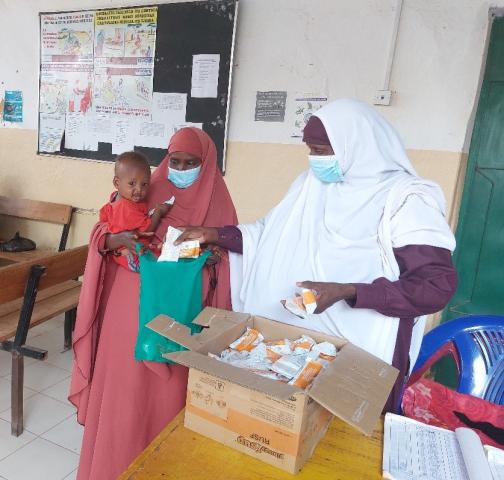
Suheyb and his mother Hodan receiving nutritional supplements. Credit: Trócaire
Hodan has three children. Her husband works as a charcoal burner and is the family breadwinner. He works hard but the $3‒$5 he makes each day just isn’t enough. Eight months ago the family had a farm. But all their livestock died during a devastating drought, and they had no choice but to leave their home to try to find help.
In Somalia, one in seven children die before the age of five. Therapeutic feeding centres dot the country, but they are overwhelmed. The country is going through its worst drought in 40 years, and more than half a million farmers and herders have lost their crops and animals. Humanitarian agencies say they have less than 3 percent of the money they need to help.
That’s why for the last three years the Mission & Service Fund has been working in partnership with Development and Peace‒Caritas Canada and the Canadian Foodgrains Bank to provide a nutrition program in the Gedo region of Somalia. There, families receive nutrition education, supplements, and treatment for malnutrition in healthcare facilities.
Hodan’s son Suheyb was badly malnourished when she brought him to the health facility for care. She had already tried everything she could on her own and he wasn’t getting better. For just over a month, Suheyb received treatment and in the end he got better.
“I never imagined that my child would recover,” says Hodan. “I am very happy to see my child’s health improve. I will continue to give him his therapeutic food regularly.”
Even though there’s enough food to feed everyone on the planet, conflict, climate change, disasters, and unjust systems that strip people of their resources mean that we have to be strongly committed to achieve the goal of a world without hunger. Together, we can build a better world.
Our congregation gives a designated amount of our annual offerings to support the work of the Mission and Service Fund of the United Church.
Minute for Mission--May 1, 2022
Kahlil’s Story

Can you imagine military breaking into your home in the middle of the night, arresting and detaining your child, and then taking them away to be interrogated? This happens every night in Palestine.
It happened to Khalil, a 17-year-old who lives in the Sheikh Jarrah neighbourhood of occupied East Jerusalem. Last June, Khalil was simply standing with his mother outside their home when he says he was attacked and assaulted by Israeli police passing by and then detained for two days before being released on bail and placed on house arrest. Even though house arrest has been lifted, he lives in constant fear.
“When I go to school, I’m constantly worried about my family…When I pass through the checkpoints at the entrances to the neighbourhood I feel as if I am in a big prison,” he says in a brave photo essay about his experience:https://www.dci-palestine.org/sheikh_jarrah_from_a_palestinian_child_s_perspective
Khalil’s photo essay was just released by Defence for Children International (DCIP), an advocacy organization supported by the Mission & Service Fund, offering free legal aid and documenting violations of international law. Although Israel ratified the United Nations Convention on the Rights of the Child in 1991, DCIP says that Palestinian children like Khalil continue to be systematically denied protections.
Our congregation gives a designated amount of our annual offerings to the Mission and Service Fund of the United Church.
Additional information:
On May 5‒8, 2022, the United Network for Justice and Peace in Palestine and Israel is hosting a conference in London, Ontario. Called “Responding to a Cry for Hope” the event will be largely led by Palestinian speakers sharing their own experiences. The Rev. Marianna Harris, a United Church minister, is one of the organizers of the event. “I have been involved in this work since 2002 when I heard what was going on in Palestine, and it completely shocked me. Since then, I’ve been to Palestine three times. I have friends there. What’s happening just isn’t right.” She encourages people to learn more about the situation in Palestine by visiting https://www.unjppi.org/index.html
Minute for Creation--April 24, 2022
Caring for Creation: A Spiritual Commitment

[We find] ourselves in a world of beauty and mystery, of living things, diverse and interdependent, of complex patterns of growth and evolution, of subatomic particles and cosmic swirls. (From A Song of Faith)
April 22 is Earth Day, a day that marks the birth of the environmental movement in 1970. It’s a day to remember and care for the earth. It’s also a day for action and justice.
A New Creed calls us “to live with respect in Creation” and as people of faith we are called to protect and care for Creation. Indigenous voices in the church remind us that we are called upon to look after Creator’s gifts and to pass along these gifts to our children.
Climate change impacts us, the local eco-systems of which we are part, and the partners that the United Church of Canada is connected with around the globe. The greatest burden of climate change is falling on people in the Far North and global South—those who have contributed least to the problem.
For the sake of these people, and for our planet, let us commit ourselves on this Earth Day 2022 to be part of a just transition to a renewable energy economy by pressuring governments and industries and by ending unsustainable overconsumption through lifestyle choices.
Let’s make every Sunday an Earth Day so we never forget our sacred call to care for the natural world and all its wonders.
In our congregation part of our weekly offerings goes to support United Church ministries and global partners who are engaged in climate justice. As well, led by our SAGE (Sustainability Action Group for the Environment) team we are currently exploring ways in which we can make our building more environmentally sustainable.
Visit the SAGE photo gallery for inspiring images of creation: Photo Gallery | Sustainability Action Group for the Environment | Comox United Church
Minute for Mission—April 17, 2022
Compassion and Peace

Jesus put compassion into action every day he lived. The story of his life, which we celebrate each Easter season, is a compelling call to make a powerful, positive difference in our world.
Acts of compassion both big and small give rise to peace. We can’t wave a magic wand and bring about world peace, but with every act of compassion we harness the power of love, the same love Jesus lived and died for and that he promised would move mountains.
Over two years since the COVID-19 pandemic began to sweep the globe, life has become harder for millions of families.
• 148,000,000 more people are having trouble putting food on the table than in 2019.
• Last year more than 80,000,000 people around the world were forced to flee their homes because of rising violence and conflict; half of them were children.
• In the last two years, visits to Canadian food banks have climbed 20 percent, with the cost of food predicted to rise 5‒7 percent this year.
When people don’t have what they need to survive, conflict is inevitable.
That is one of the reasons that the work of the Mission and Service Fund of the United Church of Canada is so crucial in our world today. This Fund supports food security initiatives, refugee work, educational programs, advocacy programmes, and emergency aid.
Our congregation gives a designated amount of our annual offerings to the Mission and Service Fund and our gifts aren’t just about supporting food, safety, education, and human rights. They are ultimately about peace. And in a world where division tears the fabric that binds us together, that’s everything.
Minute for Mission - March 13, 2022
National Affirming/P.I.E. Day

March 14 is PIE Day, and in church circles it has nothing to do with math. PIE is short for Public, Intentional, and Explicit―the standards we hold ourselves to when we seek to live into being affirming, welcoming, and inclusive people and communities.
Comox United Church became an Affirming Ministry on June 12, 2011.
Every year on PIE Day we are invited to celebrate the full inclusion of LGBTQ2SIA+ people in our faith community and beyond. The day also challenges us to continue widening our welcome to celebrate gender and sexual diversity in all its forms.
It’s critical that we do this because gender identity and sexual orientation continue to be used to justify serious human rights violations around the world. Same-sex sexual activity is a crime in 71 countries; in 11 of these the death penalty is at least a possibility or imposed.
While Canada is now home to 1 million people who identify as Two-Spirit and LGBTQQIA+ in 2019 police reported 263 hate crimes targeting people for their sexual orientation, a 41 percent increase over the previous year and the highest total since 2009.
Our congregation gives a designated amount of our annual offerings to the Mission and Service Fund of the United Church which provides life-transforming advocacy and education work, including supporting refugees fleeing for their lives because they identify as Two-Spirit and LGBTQQIA+, safe shelters, community awareness education, human rights programs, and safe spaces. For some, it means the difference between life and death.
Minute for Mission—January 16, 2022
Partnering with the Community
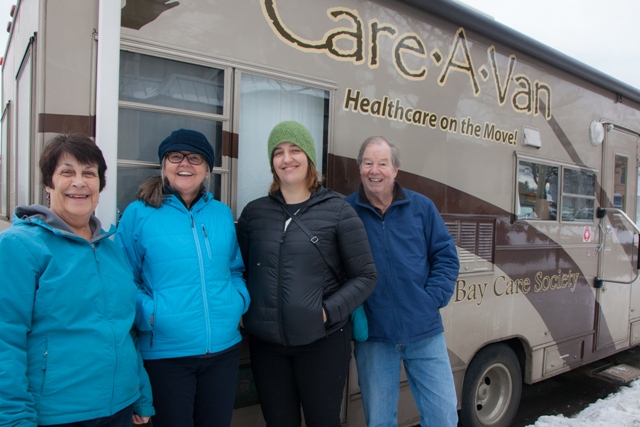
The focus of the Social Justice team for January and February is on HOMELESSNESS.
Our congregation offers financial support to several groups in our community that work with homeless and precariously housed individuals. In past years we have primarily done this through donations given at our monthly “Soup and Sandwich” lunches. In the absence of those gatherings during the past two years our church Council voted to continue offering financial support to the Care-a-Van, St. George’s Pantry, and St. Peter’s Unity Cupboard.
The Care-a-Van mobile health unit project was created and launched in April 2009 by Helen Boyd, a Registered Nurse and Mental Health Therapist. Helen is also a member of our congregation and we have been privileged to share in this dream of hers and to support the work of the project, both financially and materially. Through your generosity to our recent Advent collection we were able to deliver six large bags full of warm hats, scarves, gloves, and socks to the Care-a-Van, with additional bags going to the St. Peter’s free store and the Transition Society.
The Mission of the Care-a-Van is to provide innovative, safe, and ethical health and social development services and this is done with a staff of over 50 volunteers: nurses, doctors, pharmacists, audiologist, optometrist, denturist, harm reduction workers, advocates, social worker, occupational therapist, chiropractors, and drivers. Behind the day-to-day work are the board members, supply managers, cleaners, and technical staff. This large group of volunteers includes members of our congregation.
This year the Social Justice team is encouraging you to continue supporting the Care-a-Van in their work with the homeless. You can do this through purchasing bus tickets and laundry tickets, with donations of QF points; donations of single portion food products, such as, protein drinks, fruitcups, dried fruit, granola bars, peel top soups, juice boxes; and donations of lightly used back packs, tents, sleeping bags, clean wool or fleece blankets. All of these various kinds of donations can be dropped off at the church during office hours (Tuesday to Friday, 9:30 am to 12 noon). Thank you for supporting the work of the Care-a-Van.
